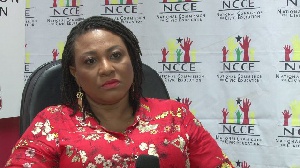 Chairperson of National Commission on Civic Education, Josephine Nkrumah
Chairperson of National Commission on Civic Education, Josephine Nkrumah
A lot needs to be done to empower Ghanaian women in decision-making although there have been some progress made over the past years, Josephine Nkrumah, Chairperson of the National Commission on Civic Education (NCCE), has said.
According to her, women’s representation in parliament is still low, a situation that must be dealt with by creating more opportunities for women.
She told Chief Jerry Forson on Ghana Yensom on Accra 100.5FM on Thursday March 8, in connection with the International Women’s Day Celebration that: “The involvement of women in decision making process is still low, the representation in parliament tells a lot about that. When we look at the executive arm of government, it is the same.
“Although women have progressed over the years in terms of involvement in decision making there is still more work to be done.
“Those of us in leadership position must come out and pull the other women along with us. To build them and also give them opportunities.”
This year’s celebration is under the theme: “Press for Progress”.
The day has been set aside to recognise the achievements of women without regard to national, ethnic, linguistic, cultural, economic or political divisions.
The first observance of a Women's Day was held on 28 February 1909 in New York.
March 8 was suggested by the 1910 International Woman's Conference to become an International Woman's Day.
After women gained suffrage in Soviet Russia in 1917, March 8 became a national holiday there. The day was then predominantly celebrated by the socialist movement and communist countries until it was adopted in 1975 by the United Nations.
The Charter of the United Nations, signed in 1945, was the first international agreement to affirm the principle of equality between women and men. Since then, the UN has helped create a historic legacy of internationally-agreed strategies, standards, programmes and goals to advance the status of women worldwide.
Over the years, the UN and its technical agencies have promoted the participation of women as equal partners with men in achieving sustainable development, peace, security, and full respect for human rights.